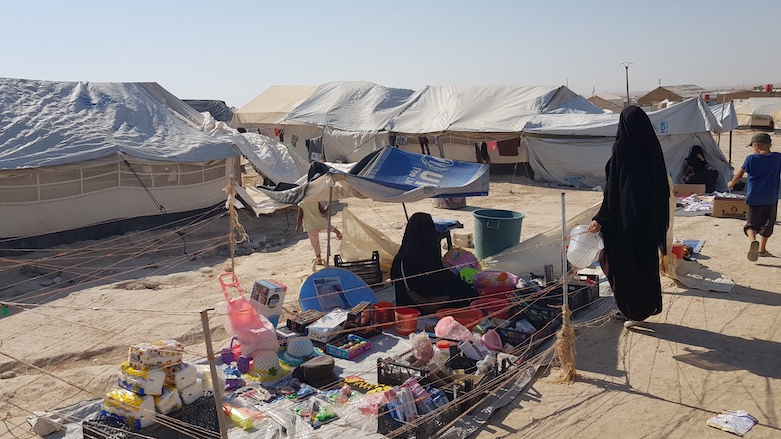Deadly riot in Syria’s al-Hol Camp shows need for more international support: MSF

ERBIL (Kurdistan 24) – Doctors Without Borders (MSF) on Monday called on the international community to intervene following a deadly riot in Syria’s al-Hol Camp where one woman was killed and at least seven others injured.
“Given the dreadful living conditions in al-Hol and other camps in northeastern Syria, along with the serious limitations on the provision of humanitarian assistance in the Annex, protests are to be expected,” Robert Onus, MSF emergency manager for Syria, said in a statement.
“The international community needs to take up its responsibility to mount a collective response to resolve this crisis in line with international legal norms, including international humanitarian and human rights law.”
On Monday, the day of the riots, MSF teams treated four women who suffered gunshot injuries. However, due to current insecurity in the camp, the MSF has temporarily reduced medical activities.
The riots have also limited the ability of humanitarian organizations to deliver much-needed assistance.
Al-Hol camp was built to house 40,000 individuals but currently holds over 69,000 people—94 percent are women and children. Among them are roughly 30,000 Iraqis. There are 10,000 foreign women and children in separate sections of the camp.
The under-resourced local Kurdish-led authorities have limited financial and humanitarian support to deal with the large number of women and children.


The camp witnessed a sharp increase in residents as the US-backed Syrian Democratic Forces (SDF) launched an offensive to defeat the so-called Islamic State in its last bastion of Baghouz, which ended in March 2019.
There is little agreement on what to do with the camp’s residents. Many nations, notably European Union member states, have shown great reluctance to take back their nationals at the camp because of fears they pose a security threat.
According to Letta Tayler, a senior terrorism and counter-terrorism researcher at Human Rights Watch (HRW), the latest violent incident at al-Hol “underscores the urgent need for countries that practice rule of law to repatriate their citizens for rehabilitation, reintegration and, if appropriate, prosecution.”
“Outbreaks of violence at al-Hol should not overshadow the need to respond to the dire humanitarian crisis at the camp, where young children and women are suffering, and many are even dying from easily preventable diseases,” Tayler told Kurdistan 24.
She added that tensions could be defused by ensuring camp residents have “clean water, healthcare, and hopes their children can lead a better life back in their homelands.”
Mutlu Civiroglu, a Kurdish affairs expert who has visited the Syrian camp, said it would be in the best interest of each country to repatriate their citizens.
“Especially children and women; children who are also victims need to be rehabilitated. But the women need to pay for their crimes,” he told Kurdistan 24.
If countries are unwilling to pick up their citizens, it would be better for them to support the creation of an international court on the ground in Syria, Civiroglu added.
“This is the least expensive and most feasible option since witnesses are also inside Syria.”

Elizabeth Dent, a non-resident scholar with the Middle East Institute’s Countering Terrorism and Extremism program, agreed that the situation in al-Hol is growing worse daily.
She said the situation is exacerbated by a policy of nearly complete disengagement from Western countries “which have thus far proven unwilling to repatriate their citizens for prosecution, or even the children born to the ISIS fighters and detainees.”
The “situation could reach a boiling point if the US does not reallocate significant resources for detention and reassert serious pressure on other countries to repatriate their citizens,” Dent continued.
Otherwise, this would leave the SDF “to manage an already tenuous situation which threatens to reverse Coalition efforts in northeast Syria.”
Editing by Karzan Sulaivany
